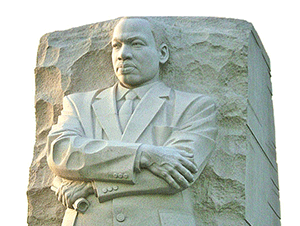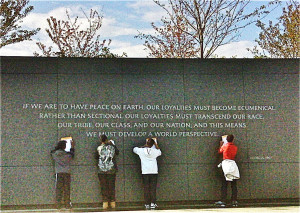Let no man pull you so low as to hate him.
Martin Luther King Jr. (1928 – 1968)
It is not enough to say, “we must not wage war.”
It is necessary to love peace and sacrifice for it.
We must concentrate not merely on the negative expulsion of war, but on the positive affirmation of peace.
Martin Luther King, Jr.
Martin Luther King, Jr.
Born in Atlanta, Georgia on January 15, 1929, Martin Luther King became synonymous with the civil rights movement. He dedicated his life to addressing this situation through non-violent means until his untimely death in 1968.
He was raised by a family of preachers and became assistant to his father at the Ebenezer Baptist Church in his hometown of Atlanta. He was college educated and started his first semester at Morehouse College when he was just 15 years old.
He attended Crozer Theological Seminary in Pennsylvania and later went on to get his PhD in theology from Boston University. While he was attending school in Boston, Martin Luther King met Coretta Scott. The two married at the home of Coretta’s parents and they raised a family of four children. His active participation in the civil rights movement began with the Montgomery bus boycott inspired by Rosa Parks. He organized the Southern Christian Leadership Conference and used it to lecture on race-related topics.
Dr. King used the media to spread the word and his participation in sit-ins and protests landed him in jail on more than one occasion. One of his most profound writings came through his letter from the Birmingham jail.
In 1963, he took part in the historic March on Washington. More than 200,000 peaceful participants gathered at the Lincoln Memorial and listened as Martin Luther King, Jr. delivered his famous, “I Have a Dream” speech.
In 1964, Dr. Martin Luther King was the youngest recipient of the Nobel Peace Prize for his unrelenting work in the civil rights movement. He led 1,500 black and white people on a march outside of Selma to bring attention to the social injustices that were going on at that time. When the group was met by a wall of state troopers, Dr. King led his group to a prayer session avoiding further confrontation with authorities.
When changes began happening in the civil rights movement, Dr. King turned his attentions to poor people and the Vietnam War. But it wasn’t long before Martin Luther King’s life came to an abrupt end when he was assassinated in Memphis Tennessee on April 4, 1968. The biography of Martin Luther King attests to the grief felt around the world with riots in over 100 cities upon hearing of his death.
Dr. King’s powerful speeches and motivating words inspired work on civil rights and issues of war and peace. On November 2, 1983 President Reagan declared Martin Luther King Jr. Daya federal holiday beginning in 1986. Today it is celebrated on the third Monday of January every year and considered a national day of service
.
Martin Luther King, Jr. National Memorial
1964 Independence Avenue SW, Washington, DC 20001
GPS Coordinates: 38.886298, -77.044415
The Memorial is located at the intersection of Independence Ave and West Basin Drive SW in Washington, D.C. There is some public parking along Ohio Avenue but parking can be extremely limited near the Memorial.
Public transportation and private tours are available. The DC Metro (WMATA) provides rail and bus service. Click to read Washington Metro (WMTA) Walking Directions from Metro Stops.
The MLK Jr. National Memorial is free and open 24 hours a day, 7 days a week.
National Park Service (NPS) Phone: (202) 426-6841
National Park Service Rangers are on duty to answer questions from 9:30 a.m. to 11:30 p.m. daily and to provide interpretive programs every hour on the hour from 10:00 a.m. until 11:00 p.m.
Situated on a four-acre site along the Tidal Basin, the Washington, DC Martin Luther King, Jr. National Memorial is adjacent to the Franklin D. Roosevelt Memorial and on a direct line between the Lincoln and Jefferson Memorials.
The Memorial was planned to evoke the memory and spiritual presence of Dr. King. It is intended to honor not only a great man, but the values that empowered his leadership, including courage and truth, unconditional love and forgiveness, justice and equality, reconciliation and peace.
Every nation must now develop an overriding loyalty to mankind as a whole
in order to preserve the best in their individual societies.
Martin Luther King, Jr. (1928 – 1968)
I say to you today, my friends, that in spite of the difficulties and frustrations of the moment,
I still have a dream.
It is a dream deeply rooted in the American dream.
Martin Luther King, Jr. (1928 – 1968)




